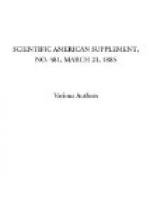At this Conference several other subjects were brought up which attracted a good deal of attention. Professor Rowland brought forward a paper on the theory of dynamos that certainly startled a good many of us; and it led to a discussion that is admirably reported in our scientific papers. I think that the discussion evolved by Professor Rowland’s paper on the theory of dynamos deserves the study of every electrician; it brought very strongly into prominence one or two English gentlemen who were present. Professor Fitzgerald, of Dublin, spoke with a considerable amount of power, and showed a mastery of the subject that was pleasant not only to his friends, but must have been gratifying to the Americans who heard him. On this particular subject of dynamos it was truly wonderful how the doctors disagreed. Two could not be found who held the same views on the theory and construction of the dynamo, and that shows that we still have a great deal to learn about the dynamo, and that the true principle of construction of it has yet to be brought out.
It is a very curious thing, and I thought about it at the time, that when you consider the dynamos in use, you see how very little has been done to perfect the direct working dynamo in England. Although the principle of the dynamo originated with Faraday, yet all the early machines, Pacinotti, Gramme. Hefner von Alteneck, Shuckert, Brush, Edison, and several others who have improved the direct action machine, have not been found in England. But when we deal with alternate-current machines, then we find the Wilde, Ferranti, and various others; so that the tendency in England has been very much to improve and work upon the alternate-current machines. In other countries it is exactly the reverse; in fact, in America I never saw one single alternate-current machine. When Professor Forbes wanted an alternate-current machine to illustrate a lecture that he gave, it was with the greatest difficulty that one could be found, and, in fact, it was put together specially for him.
The other subjects brought before this Conference were Earth Currents, Atmospheric Electricity, Accumulators or Secondary Batteries, and Telephones. There was an extremely able paper brought forward by Mr. T.D. Lockwood, the electrician of the American Bell Telephone Company, on Telephones, and the disturbances that influence their working. When that paper is published, it will well be worth your careful examination.
Papers were also read on the Transmission of Energy, and there were papers on many other subjects.
So much for the Electrical Conference.
Now, the Americans at the present moment are suffering from a mania which we, happily, have passed through, that is, the mania of exhibitions.




